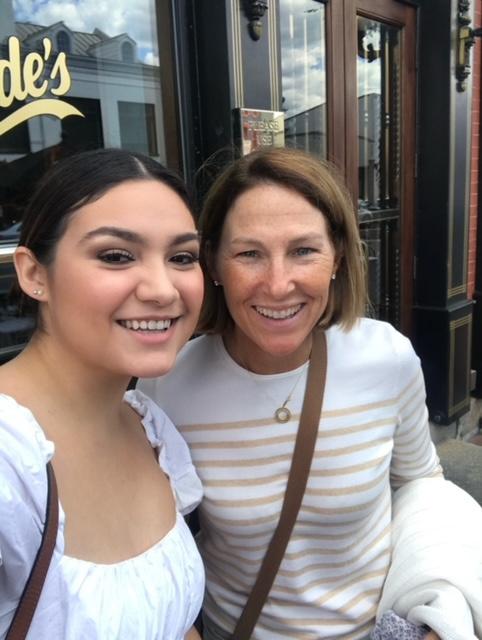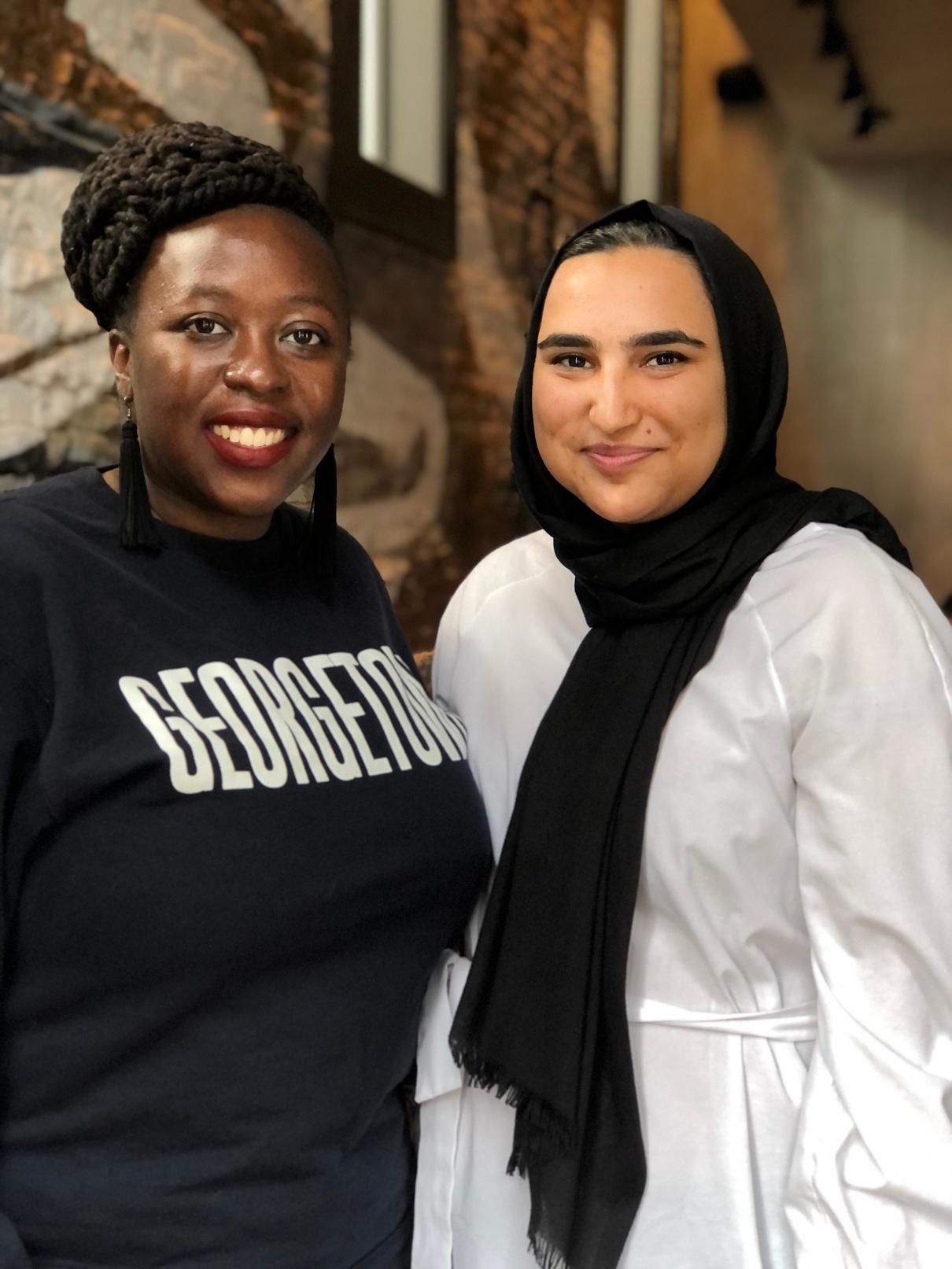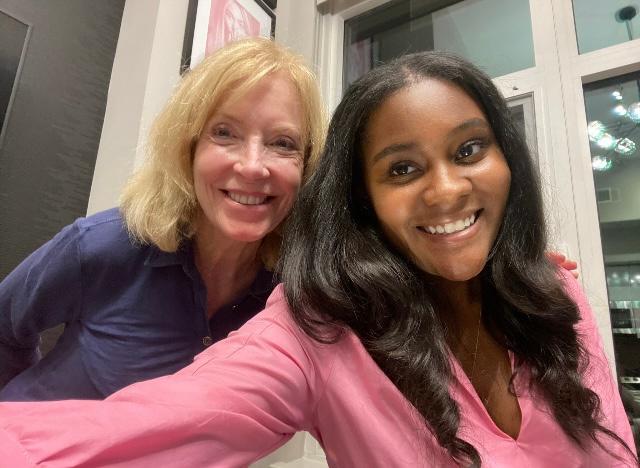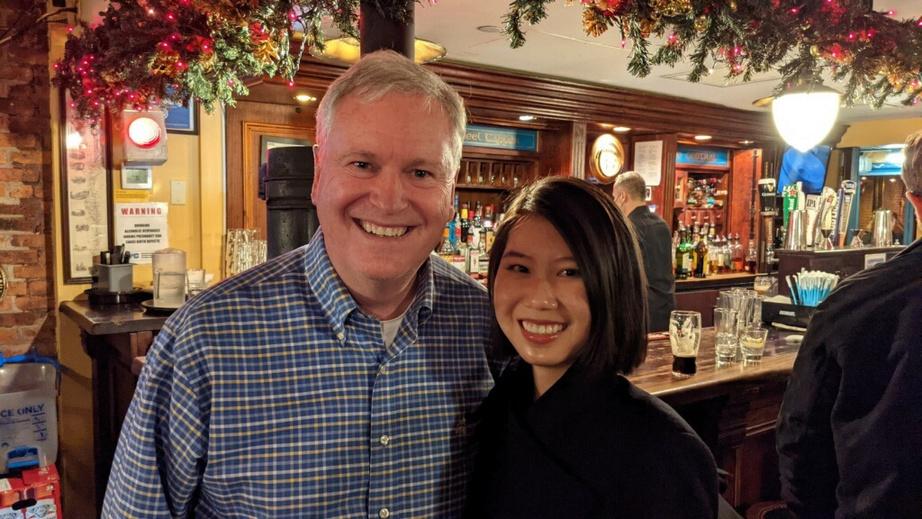




-
of the
Alumni
Program (Claire and her mentee Yaxeni Valero grabbing a bite to eat to celebrate her graduation in May 2021)

The Georgetown Scholars Program (GSP) was founded in 2004 and has served over 2,600 students and graduates, most of whom were the first generation in their families to attend college, since the program’s inception. Currently, GSP provides programmatic support for over 650 undergraduates; we work with students as they navigate through elite higher education. GSP’s mission is to work towards a more equitable college experience for first-generation and low-income college students. GSP students proudly hold a 94% graduation rate.
The program aims to increase the sense of belonging for first-generation and low-income students and strengthen their academic and personal growth. Through GSP, students find a supportive community that is eager to see them succeed. As a GSP mentor, your personal and consistent connection with your mentee will support their ability to not only survive, but to thrive.
Thank you for being a key part of this mission!
"Mentoring has been one of the most gratifying experiences of my life."
Claire Joyce, Founder and Former Chair
GSP
Mentor
Mentors provide one-on-one guidance to GSP students on a wide range of topics including: navigating Georgetown and the college experience, encouraging career and academic interests, pursuing extra-curricular opportunities, and providing a caring, supportive, and informed perspective.


Connect with your mentee upon pairing via Zoom or phone.
Share contact information and begin to establish a rapport. Meet your student in person, when possible, on campus or in your shared hometown.
Connect monthly on topics of concern to your mentee: adjusting to life on campus, housing and financial stressors, internships, career guidance, study abroad, etc.
Explore resources provided throughout the year by the GSP team including: program opportunities and updates, best practices and articles on the first-generation experience, and other information to help you maximize your impact.
We encourage the students to consider five important traits to best connect with their mentors. They should be responsive, curious, authentic, vulnerable, and open-minded.

Get to know your mentee(s) a little better. The school year has officially kicked off, so remind students to not overwhelm themselves with classes + extracurriculars. Remind students to touch base with their on-campus mentors as well! This is also a good time to offer to help students with resumes, LinkedIn profiles, etc. Check out the Cawley Career Center for tips!
Midterm season continues through the end of November! Offer words of encouragement! Check in with students about their plans for Thanksgiving. Remind them that many students choose to remain on campus for the break and that GSP plans free activities.
Reach out to your mentee(s); we highly recommend a Zoom meeting to help build a student’s Hoya network even before classes begin!
Midterm season starts in October! Offer words of encouragement! Remind your mentee to attend office hours with all professors (they may appreciate guidance on how to approach their professor to build a rapport). Many students choose to fly home for Thanksgiving Break in November. Remind your mentee to buy their ticket early since flights get pricey!
Finals! Offer words of support and encouragement. Check in with students about their plans for Winter break – remind them that dorms and the dining hall close during this time. Help students interested in seeking professional opportunities during break by connecting them with nearby opportunities. It may be worth contacting their Regional Coordinator.
Welcome back to campus! Check in with students at this point to remind them that if they plan on seeking summer internship opportunities, they should begin looking into them now (and not wait until summer!)
Check in with students about their plans for the summer. Most summer opportunities have deadlines in early March/April. Spring Break is a great time to unwind but also to fine-tune applications.
May
Finals! Offer words of support and encouragement. If you have a senior mentee consider joining GSP at our Graduation Celebration! Offer congrats to grads.
February
Midterm season! Offer words of support and encouragement. Check in with students about plans for Spring Break. Remind them that many students choose to remain on campus for the break and that GSP plans free activities and meals during this time.
Check in with students about plans for Easter Break. Remind them that many students choose to remain on campus for the break and that GSP plans free activities and meals during this time.
June/July
Touch base with your mentee(s) throughout the summer and provide feedback on their activities and plans.
As you may recall from your own time at Georgetown, years tend to be very cyclical. We hope that you found the previous section helpful in mapping out the typical year at Georgetown. Now, we’d like to focus on specific benchmarks and opportunities that will be helpful as you go year-to-year with your mentee(s). As we mentioned before, your relationship will evolve and morph over the years. Use the following benchmarks and opportunities to stay in tune to the experiences your mentee(s) is going through.
Students declare their majors. Each school has its own timeline, so be sure that your mentee(s) is checking in with their dean. This is also a good year to have conversations about their interests and their talents. We hope you will become a trusted person our students can turn to when evaluating next steps in their journey. We encourage you to help guide your mentee student through the discernment process given your unique perspective as a GU grad. Sometimes all a student needs is reassurance that they can be successful by following their passions and interests; other times they just need encouragement that there is no wrong choice! Many students choose to pursue careers viewed as "successful" (such as medicine, law, finance). Some choose to do so because they are passionate about the field, others choose them because it feels like something they "should" do. It may be valuable for your mentee to help them discern their reason and whether this is a career they truly want.
Applications for study abroad go out late in the first semester (for summer) and into the second semester for the following year. Students begin to think about their professional development and how this may tie into summer plans. Encourage them to do a cost-benefit analysis of doing an unpaid internship (how to they plan to pay for rent, food, etc.), the benefits of going back home versus staying in DC, and the multitude of other variables that go into planning their summer. Start early!
The Bakers Scholars Program and the Idol Family Summer Fellowship are great opportunities to chat with your student about (to name a few!)!
Finance and Consulting Firms recruit in the Fall. Students heavily seek out summer internships across all career fields.
Applications for study abroad are available in both Spring and Fall. Check in with your mentee(s) about how they're feeling about their major(s) and minor(s).
Some students choose to study abroad in their Junior year. They may seek out advice and support during this transition.

Finance and Consulting Firms recruit for full time positions in the Summer through to the Fall.
Students begin to seek out employment for post-graduation.
Post graduate fellowship applications are available in the Fall.
Disorientation Weeks (Dis-O) in both the Fall and Spring.
Graduation!
Financial Aid teams are on the front lines here! Encourage your mentee(s) to approach their financial aid team directly with questions about loans, scholarships, work-study, and study abroad funding.
Above and beyond the scope of federal programs, first-generation college students have unique financial needs. The GSP Necessity Fund was designed to help offset unforeseen emergency costs including medical and mental health care, emergency flights home, tutoring and more. Students can apply for funding as often as needed by using the GSP Grant Application. Funds are available throughout the year, including summer. All applications are reviewed on a case by case basis by a committee of financial aid professionals.
The Cawley Career Education Center is the most specialized resource for career and professional support. They host walk-in hours, one-on-one counseling, mock interviews, resume reviews, professional assessment tests, various campus recruitment events, and share industry newsletters with opportunities for students of all fields.
If financial concerns are playing into your mentee's career-related stress, please know that the GSP Professional Development Fund is available to juniors and seniors. The Professional Development Fund aims to support GSP students with unexpected costs, in this case, related to academic and professional development. This fund is particularly useful in helping to cover the cost of GRE/LSAT/MCAT test preparation, travel to academic conferences, professional attire, travel to graduate school or job interviews, etc. Juniors and seniors can apply for this additional funding (all applications are reviewed by the grants committee) up to $300 a year.
GSP regularly shares up to date employment and funding opportunities via our LinkedIn group, our Achieve Corner on our website, and via our Achieve Newsletter. We encourage students to begin planning their summer in January since many opportunities close in February and March and to take advantage of all the funding resources our colleagues at Cawley put together!
Students can visit the Writing Center in Lauinger Library for support in their writing skills. The Academic Resource Center (ARC) provides comprehensive academic support including academic accommodations, yearly skills workshops, individual tutoring, study planning, and referrals for testing for learning disabilities. In addition to the ARC’s resources, mentees can contact departments as they often host free tutoring or contact GSP staff for additional resources.
Georgetown's on-campus Counseling and Psychiatric Services, CAPS, are available to support students with their mental health. They see and treat many students every year. They also make referrals to city partners for students requiring more extensive treatment. The GSP Necessity Fund can also be a resource for additional mental health needs! There is also a variety of additional wellness resources for students! Other student wellness resources can be found on the Every Hoya Cares website.
Students interested in Research and Fellowship opportunities can contact the Center for Research and Fellowships. There they can discuss opportunities, timelines, expectations and requirements. Aside from opportunities via the Center for Research and Fellowships, encourage your mentee(s) to reach out to a professor whose class or work they enjoyed learning about. In many cases professors may have research opportunities within their labs or a colleague's that they can share once your mentee builds that connection!
The Hoya Hub Food Pantry is a resource for students experiencing food insecurity. Located in room 418 of the Leavey Center, it is a pantry stocked with non-perishable food items and students can visit as often as necessary.
Please browse the Office of Global Education’s website for more information about programs and what to expect. Something helpful to keep in mind is that when studying abroad during the academic year, a student’s financial aid (including Georgetown scholarships!) “travels” with them. While studying abroad during the summer can be a pricey endeavor (since GU financial aid is limited for summer courses), it's worth encouraging your mentee(s) to contact their financial aid team and the director of the course/program they're interested in, to discuss potential funding options.
We are excited to continue growing the GSP Regional Network Program to provide GSP students with local networking opportunities, help with job/internship services, support with special circumstances, and a readymade alumni network for recent graduates. Our Regional Network Coordinators act as regional contacts for GSP students across the country. They are especially helpful if you’d like to connect your student with someone from their hometown or a particular city. We encourage you to introduce yourself to your local Regional Coordinator.
We’re proud to say that Georgetown’s LGBTQ Resource Center is the first of its kind at a Jesuit institution and a place that many of our LBGTQ students call home. Having said that, not all students that identify as LGBTQ are particularly active in the Center or in LGBTQ campus life. Allow your mentee to set the tone.
Keep in mind that a student’s legal immigration status is a delicate issue with very real implications. Please direct them to undocumented.georgetown.edu. This website has aggregated the resources available on-campus to undocumented students. If students have further questions, please direct them to a GSP Staff Member. To learn more about support for undocumented students, or if you know of students needing support, please contact the UndocuHoyas email address at undocuhoyas@georgetown.edu.
We have collected some articles and media that we think are just great. Please consider exploring these:
When a sudden, small expense threatens an entire college career
By Karen WeeseThe Privileged Poor: How Elite Colleges Are Failing Disadvantaged Students
by Anthony Abraham JackThe Deepest Well
by Nadine Burke Harris, M.D.Educated: A Memoir
by Tara WestoverBreaking Night
by Liz MurrayPodcast: What Happens To Low-Income Students In High-Priced Universities?
By Danielle Knight and Kathryn Finkhttps://the1a.org/shows/2019-02-25/the-privileged-poor
Podcast: Strength in the Midst of Change, Seeing Oneself As DeservingSupport, featuring Rachel Gable
http://www.cew.umich.edu/story/rachel-gable/
